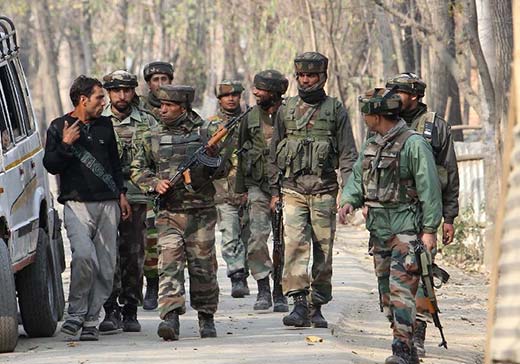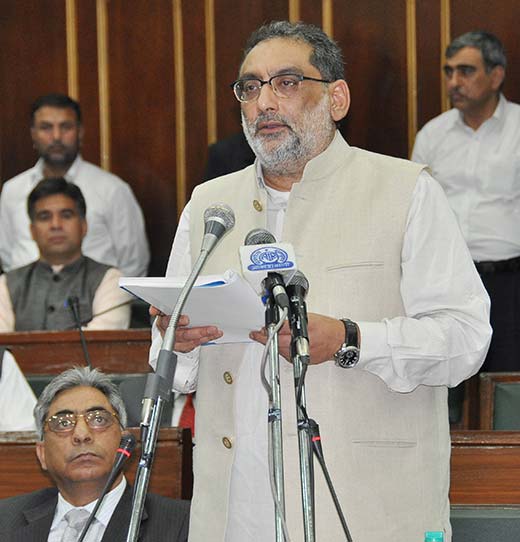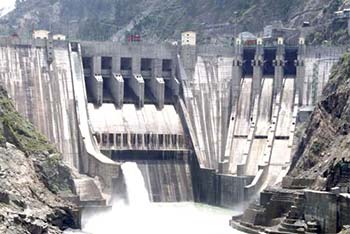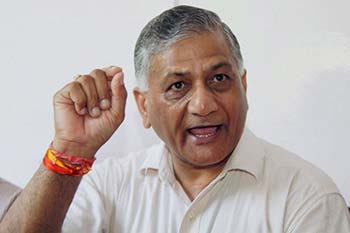No DAA
 State Legislative Council has disallowed a resolution seeking revocation of Disturbed Areas Act (DAA) from the state saying the law is not in force and has lapsed in 1998.
State Legislative Council has disallowed a resolution seeking revocation of Disturbed Areas Act (DAA) from the state saying the law is not in force and has lapsed in 1998.
“This is to inform you that the Jammu and Kashmir Disturbed Act, 1997 was valid for only one year and has lapsed on 7th October 1998. At present the DAA is not in force in the State. Therefore, the resolution submitted by you for revocation of DAA has been disallowed,” Additional Secretary, Legislative Council, in a written communique informed.
Bashir Ahmed Veeri, had moved a resolution in the Question Hour session in the Upper House.
“There should be debate on the issue as it has wider ramifications. AFSPA has become infructuous in the state due to absence of DAA,” Veeri repeatedly said in the House.
Later, the legislator trooped into the well of the House and proceeded towards the chair.
On this, the chairman ordered Marshals to evict him from the House.
The Jammu and Kashmir Disturbed Areas Act was enacted during Governor’s Rule in 1990.
The law conferred special powers to civil magistrates and police officers not below the rank of Sub-Inspector or Head Constable in case of the Armed Branch of the Police in the areas declared as disturbed.
The power to declare any area as disturbed under this law vested with State government.
White Paper
 Most of budget plans for the state of Jammu and Kashmir were drafted by the National Conference and by the end of every fiscal, this government used to run short of funds. But this time when state government is run by other political party, PDP which is still in its infacy compared to the older party, has hit the chords by promising to produce a white paper by the end of its tenure.
Most of budget plans for the state of Jammu and Kashmir were drafted by the National Conference and by the end of every fiscal, this government used to run short of funds. But this time when state government is run by other political party, PDP which is still in its infacy compared to the older party, has hit the chords by promising to produce a white paper by the end of its tenure.
The promise, of giving a document which would assess the financial position under his regime and what went wrong earlier, by the finance minister, Dr Haseeb Drabu in his maiden budget speech has put Omar’s government on tenter hooks.
Drabu had said that the government would restore fiscal autonomy of the state and his government will no more go out with ‘begging bowl’ to the central government. And his government will bring out a white paper on financial position of the state to understand as to what led to Rs 9,000 crores worth liabilities and not to indulge in any blame game. The white paper is supposed to suggest a way forward and restore fiscal autonomy in the state.
State finance minister while discussing the state budget had said the government will come up with a white paper on its performance. “We will also come up with what has gone wrong in the past and where vis-a-vis fiscal management,” he told Assembly.
While reacting to the finance minister’s speech, the former chief minister of state, Omar Abdullah said that instead of presenting a white paper for his tenure as the finance minister, he should give it since 1996. “And everything will be revealed.” But Omar didn’t mention what he wished to reveal. But he was quick to add that if present government wants to bring out the white paper on six-year period of governance, let him bring.
Pertinently, Drabu was financial advisor to the state government, and chairman of J&K Bank.
NET Rule
Finally it is official. Supreme Court declared NET/SLET as a minimum eligibility condition for recruitment and appointment of lecturers in Universities and Colleges. “The verdict of SC is law and everyone has to abide it,” Education Minister, NaeemAkhtar said.
There are around 1700 posts of Assistant Professors lying vacant in various colleges in Jammu and Kashmir and the process for the recruitment was halted by the High Court on the petition of MPhil holders who wanted to be considered for the posts.
Though the state government maintained that M Phil holders cannot teach at colleges level without having qualified NET or SLET, the stay order by the High Court continues to remain in vogue with colleges across the state facing severe dearth of the staff.
In another major development, stressing the need for maintaining excellence in standards of higher education, the Supreme Court also upheld the constitutional validity of the 2009 University Grants Commission Regulations by which NET/SLET was laid down as the minimum eligibility condition for recruitment and appointment of lecturers in universities and colleges.
A bench of Justices T S Thakur and Rohinton F Nariman dismissed a bunch of appeals filed by M Phil and PhD degree holders, who had claimed that the rule prejudiced their interests and they were thrown out of the zone of consideration abruptly. They claimed it was violation of their right to equality under Article 14 of the Constitution since it was discriminatory.
The objective of directions of the Central government when read with the UGC regulations of 2009/2010 was to maintain excellence in standards of higher education, the court maintained.
Emphasising upon the requirement of a consistent policy, it said: “There may have been exemptions laid down by the UGC in the past but the Central government now as a matter of policy feels that any exemption would compromise the excellence of teaching standards in universities/colleges/ institutions governed by the UGC. Obviously, there is nothing arbitrary or discriminatory in this — in fact it is a core function of the UGC to see that such standards do not get diluted.”
Power Snag
 After withdrawal of circular that made hoisting of state’s flag along the Indian tricolour mandatory for all constitutional authories, the second big blow to the newly elcted PDP-BJP colation came when Union Power Ministry outrightly rejected to transfer power projects, owned by the National Hydroelectric Power Corporation (NHPC), to Jammu and Kashmir. The unionists cited “legal and financial reasons” for not transferring them.
After withdrawal of circular that made hoisting of state’s flag along the Indian tricolour mandatory for all constitutional authories, the second big blow to the newly elcted PDP-BJP colation came when Union Power Ministry outrightly rejected to transfer power projects, owned by the National Hydroelectric Power Corporation (NHPC), to Jammu and Kashmir. The unionists cited “legal and financial reasons” for not transferring them.
New Delhi responded when state is claiming that it is likely to get at least, 390 MW DulHasti and 480 MW Uri I, back from NHPC.
From time to time different panels have recommended that at least two power projects should be returned to the state for boosting the state’s economic scenario.
However, the New Delhi disclosed that the recommendations made by the panels “haven’t been accepted by Government of India as the power generated from the projects stands already allocated to various States including J&K.”
“Also the transfer of projects is likely to entail considerable financial, non-financial and legal problems,” Union Minister of State for Power Piyush Goyal has said in his written response to a question by Peoples Democratic Party’s MP Tariq Hameed Karra.
Karra had raised the query during recently-held budget session in the Parliament.
Singh Controversy
 The retired General VK Singh, former chief of Indian Army and now Minister of State for Foreign Affairs in Modi government, once again hit the headlines when he attended Pakistan Day celebrations where Kashmiri pro-freedom leaders were also present.
The retired General VK Singh, former chief of Indian Army and now Minister of State for Foreign Affairs in Modi government, once again hit the headlines when he attended Pakistan Day celebrations where Kashmiri pro-freedom leaders were also present.
As soon as the New Delhi based news channels got whimp of Singh’s participation, they started questioning his “intrigety”. And all hell broke lose. Sensing public mood and anger againt him Singh tried to justify his participation in a series of tweets.
Pertenently Singh is the same general who was questioned in an internal investigation into the TSD functioning, which revealed that he had paid Rs 1.19 crore to former Agriculture Minister of J&K, Ghulam Hassan Mir for toppling NC government at the peak of 2010 unrest in which government forces killed 120 youth.
TSD was set up by General V K Singh in May 2010 and it shot into limelight in March 2012 with the allegations that it had tapped the phones of Defence Ministry officials.
TSD had strong Kashmir connection. Singh had allegely imported some high-end eavesdropping machineries from Singapore which were initially given to Srinagar based 15 corps. For some technical reasons, these machines meant for off air tapping, were returned. But the equipment was never moved out. It functioned at various places across J&K in hired premises and was reportedly under direct control of Army headquarters.
Former general was summoned by the state legislative assembly of J&K as well but he never showed up nor did he replied to the questions raised by the honorable speaker of the house.















